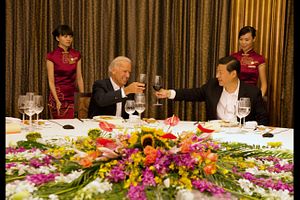Two days after the United States government finally began the official transition process with President-elect Joe Biden and his team, China’s president reached out to offer his congratulations.
As The Diplomat has covered previously, China was slow to acknowledge Biden as the winner of the November 3 election amid lingering (and, according to the results, baseless) legal challenges from incumbent President Donald Trump. While congratulations poured in from leaders around the world, China’s President Xi Jinping remained silent. The first official congratulations to Biden and Vice President-elect Kamala Harris came not from Xi, but from a Chinese Foreign Ministry spokesperson on November 14.
Now, however, Xi himself has finally reached out personally. According to Xinhua, China’s state news agency, Xi called Biden on November 25 to congratulate him on his election as U.S. president. The Chinese Ministry of Foreign Affairs also released the Xinhua statement in English translation:
Promoting healthy and stable development of China-U.S. relations not only serves the fundamental interests of the people in both countries, but also meets the common expectation of the international community, Xi said.
Xi said he hopes that the two sides will uphold the spirit of non-conflict, non-confrontation, mutual respect and win-win cooperation, focus on cooperation, manage differences, advance the healthy and stable development of China-U.S. ties, and join hands with other countries and the international community to promote the noble cause of world peace and development.
Notably, the English translation says Xi “sent a message,” meaning he and Biden did not actually speak on the phone. The brief statement also mentioned that Chinese Vice President Wang Qishan had sent a message to Harris.
As mentioned earlier, Xi is a latecomer in both congratulating and calling Biden. In just the Indo-Pacific region alone, Biden has already held phone calls (involving actual conversations, not just messages) with New Zealand Prime Minister Jacinda Ardern (on November 22), Indian Prime Minister Narendra Modi (on November 17), Australian Prime Minister Scott Morrison, Japanese Prime Minister Suga Yoshihide, and South Korean President Moon Jae-in (all three on November 11).
In those calls, the readout from the Biden-Harris transition office repeatedly spoke of the goal of “maintaining a secure and prosperous Indo-Pacific region,” suggesting that will be a key framework Biden’s Asia strategy. That implies some continuity with the Trump administration’s “free and open Indo-Pacific,” which Beijing sees as a China containment strategy.
Meanwhile, Xi’s message to Biden likewise suggests more continuity than change. The language is typical of Chinese statements on U.S. relations – and in more pointed pronouncements, Chinese officials have been clear that it is Washington, not Beijing, that is expected to change positions to bring China-U.S. relations on the right track.
The outreach from Xi leaves Russia’s Vladimir Putin as one of the few world leaders still refusing to reach out to Biden. Despite formally beginning the transition process, Trump has insisted he is not conceding the election and will continue to file lawsuits against the results.

































